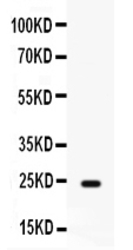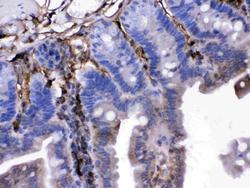PB9944
antibody from Boster Biological Technology
Targeting: FGF1
AFGF, ECGF, ECGF-beta, ECGFA, ECGFB, FGF-alpha, FGFA, GLIO703, HBGF1
Antibody data
- Antibody Data
- Antigen structure
- References [2]
- Comments [0]
- Validations
- Western blot [1]
Submit
Validation data
Reference
Comment
Report error
- Product number
- PB9944 - Provider product page

- Provider
- Boster Biological Technology
- Product name
- Anti-FGF1 Antibody Picoband™
- Antibody type
- Polyclonal
- Description
- Polyclonal antibody for FGF acidic/FGF1 detection. Host: Rabbit.Size: 100μg/vial. Tested applications: ELISA. Reactive species: Human. FGF acidic/FGF1 information: Molecular Weight: 17460 MW; Subcellular Localization: Secreted. Cytoplasm. Cytoplasm, cell cortex. Cytoplasm, cytosol. Nucleus. Lacks a cleavable signal sequence. Within the cytoplasm, it is transported to the cell membrane and then secreted by a non-classical pathway that requires Cu(2+) ions and S100A13. Secreted in a complex with SYT1 (By similarity). Binding of exogenous FGF1 to FGFR facilitates endocytosis followed by translocation of FGF1 across endosomal membrane into the cytosol. Nuclear import from the cytosol requires the classical nuclear import machinery, involving proteins KPNA1 and KPNB1, as well as LRRC59; Tissue Specificity: Predominantly expressed in kidney and brain. Detected at much lower levels in heart and skeletal muscle.
- Reactivity
- Human, Mouse, Rat
- Host
- Rabbit
- Vial size
- 100μg/vial
- Concentration
- Add 0.2ml of distilled water will yield a concentration of 500ug/ml.
- Storage
- At -20°C for one year. After reconstitution, at 4°C for one month. It can also be aliquoted and stored frozen at -20°C for a longer time. Avoid repeated freezing and thawing.
- Handling
- Add 0.2ml of distilled water will yield a concentration of 500ug/ml.
Submitted references Levels of plasma glycan-binding auto-IgG biomarkers improve the accuracy of prostate cancer diagnosis.
Loss of AKR1B10 promotes colorectal cancer cells proliferation and migration via regulating FGF1-dependent pathway.
Dos Santos JM, Joiakim A, Kaplan DJ, Putt DA, Perez Bakovic G, Servoss SL, Rybicki BA, Dombkowski AA, Kim H
Molecular and cellular biochemistry 2021 Jan;476(1):13-22
Molecular and cellular biochemistry 2021 Jan;476(1):13-22
Loss of AKR1B10 promotes colorectal cancer cells proliferation and migration via regulating FGF1-dependent pathway.
Yao Y, Wang X, Zhou D, Li H, Qian H, Zhang J, Jiang L, Wang B, Lin Q, Zhu X
Aging 2020 Jul 2;12(13):13059-13075
Aging 2020 Jul 2;12(13):13059-13075
No comments: Submit comment
Supportive validation
- Submitted by
- Boster Biological Technology (provider)
- Main image

- Experimental details
- Western blot analysis of FGF1 expression in rat cardiac muscle extract (lane 1). FGF1 at 24KD was detected using rabbit anti- FGF1 Antigen Affinity purified polyclonal antibody (Catalog # PB9944) at 0.5 μg/mL. The blot was developed using chemiluminescence (ECL) method (Catalog # EK1002).
- Additional image

 Explore
Explore Validate
Validate Learn
Learn Western blot
Western blot ELISA
ELISA